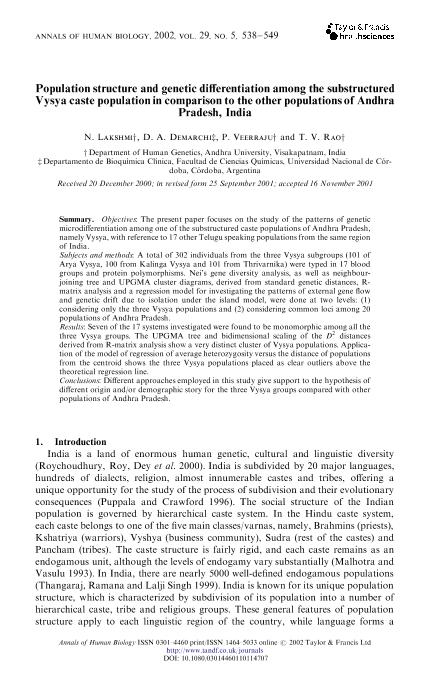Mostrar el registro sencillo del ítem
dc.contributor.author
Lakshmi, N.
dc.contributor.author
Demarchi, Dario

dc.contributor.author
Veerraju, P.
dc.contributor.author
Rao, T. V.
dc.date.available
2021-05-17T20:11:46Z
dc.date.issued
2002-12
dc.identifier.citation
Lakshmi, N.; Demarchi, Dario; Veerraju, P.; Rao, T. V.; Population structure and genetic differentiation among the substructured Vysya caste population in comparison to the other populations of Andhra Pradesh, India; Taylor & Francis Ltd; Annals of Human Biology; 29; 5; 12-2002; 538-549
dc.identifier.issn
0301-4460
dc.identifier.uri
http://hdl.handle.net/11336/132183
dc.description.abstract
The present paper focuses on the study of the patterns of genetic microdifferentiation among one of the substructured caste populations of Andhra Pradesh, namely Vysya, with reference to 17 other Telugu speaking populations from the same region of India. A total of 302 individuais from the three Vysya subgroups (101 of Arya Vysya, 100 from Kalinga Vysya and 101 from Thrivarnika) were typed in 17 blood groups and protein polymorphisms. Nei's gene diversity analysis, as well as neighbour-joining tree and UPGMA cluster diagrams, derived from standard genetic distances, R-matrix analysis and a regression model for investigating the patterns of external gene flow and genetic drift due to isolation under the island model, were done at two levels: (1) considering only the three Vysya populations and (2) considering common loci among 20 populations of Andhra Pradesh. Seven of the 17 systems investigated were found to be monomorphic among all the three Vysya groups. The UPGMA tree and bidimensional scaling of the D2 distances derived from R-matrix analysis show a very distinct cluster of Vysya populations. Application of the model of regression of average heterozygosity versus the distance of populations from the centroid shows the three Vysya populations placed as clear outliers above the theoretical regression line. Different approaches employed in this study give support to the hypothesis of different origin and/or demographic story for the three Vysya groups compared with other populations of Andhra Pradesh.
dc.format
application/pdf
dc.language.iso
eng
dc.publisher
Taylor & Francis Ltd

dc.rights
info:eu-repo/semantics/openAccess
dc.rights.uri
https://creativecommons.org/licenses/by-nc-sa/2.5/ar/
dc.subject.classification
Antropología, Etnología

dc.subject.classification
Sociología

dc.subject.classification
CIENCIAS SOCIALES

dc.title
Population structure and genetic differentiation among the substructured Vysya caste population in comparison to the other populations of Andhra Pradesh, India
dc.type
info:eu-repo/semantics/article
dc.type
info:ar-repo/semantics/artículo
dc.type
info:eu-repo/semantics/publishedVersion
dc.date.updated
2021-04-23T17:04:55Z
dc.identifier.eissn
1464-5033
dc.journal.volume
29
dc.journal.number
5
dc.journal.pagination
538-549
dc.journal.pais
Reino Unido

dc.journal.ciudad
Londres
dc.description.fil
Fil: Lakshmi, N.. Andhra University; India
dc.description.fil
Fil: Demarchi, Dario. Consejo Nacional de Investigaciones Científicas y Técnicas. Centro Científico Tecnológico Conicet - Córdoba. Instituto de Antropología de Córdoba. Universidad Nacional de Córdoba. Facultad de Filosofía y Humanidades. Instituto de Antropología de Córdoba; Argentina
dc.description.fil
Fil: Veerraju, P.. Andhra University; India
dc.description.fil
Fil: Rao, T. V.. Andhra University; India
dc.journal.title
Annals of Human Biology

dc.relation.alternativeid
info:eu-repo/semantics/altIdentifier/doi/http://dx.doi.org/10.1080/03014460110114707
dc.relation.alternativeid
info:eu-repo/semantics/altIdentifier/url/https://www.tandfonline.com/doi/abs/10.1080/03014460110114707
Archivos asociados
